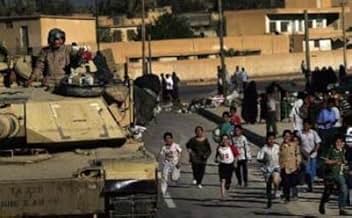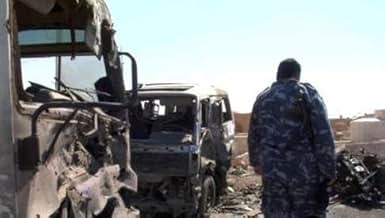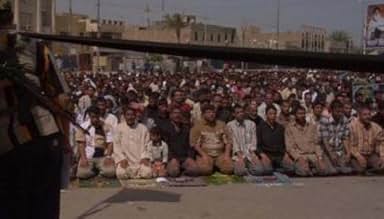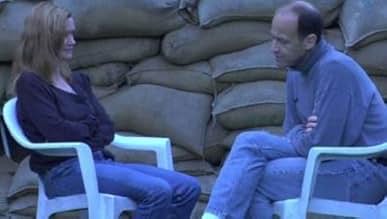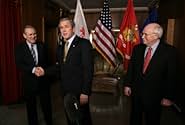IMDb RATING
8.2/10
8.8K
YOUR RATING
A comprehensive look at the Bush Administration's conduct of the Iraq war and its occupation of the country.A comprehensive look at the Bush Administration's conduct of the Iraq war and its occupation of the country.A comprehensive look at the Bush Administration's conduct of the Iraq war and its occupation of the country.
- Nominated for 1 Oscar
- 12 wins & 19 nominations total
Campbell Scott
- Narrator
- (voice)
George Tenet
- Self
- (archive footage)
Dick Cheney
- Self
- (archive footage)
Donald Rumsfeld
- Self
- (archive footage)
Paul Wolfowitz
- Self
- (archive footage)
Colin Powell
- Self
- (archive footage)
Feisal Istrabadi
- Self
- (as Faisal Al-Istrabadi)
Ahmad Chalabi
- Self
- (archive footage)
- Director
- Writer
- All cast & crew
- Production, box office & more at IMDbPro
Featured reviews
10ackthpt
Summed up in this documentary film are the decisions and consequences of invading Iraq. It is presented in a factual and nonhumourous manner, without apparent axe to grind.
Iraq was invaded for what were certainly dubious reasons, which have each come to light and been discredited in turn since the invasion, including the Joseph Wilson/Valerie Plame affair. Eventually President George W. Bush would distance himself from the original WMD and terrorism claims used to justify invasion of this country and would be somewhere along the lines of it being a justifiable thing to depose a dictator who killed his own countrymen.
Present are interviews with people on the ground or deeply involved in Iraq from former administration people such as Richard Armitage to Office for Reconstruction and Humanitarian Assistance (ORHA), United Nations, soldiers and Iraqi people. The tally is grim as each tells of of the arrogance, mismanagement or blind stupidity which contributes to the situation in Iraq.
As a student of World War II I was utterly flummoxed by the decision to route the Ba'athists from their jobs and to disband a military of 500,000 professional soldiers, leaving them no way to support their families. Following the tide of the allies across Germany, local police, politicians and government workers were largely left in place to maintain order and services so as not to encumber the allied effort. After victory was achieved came the search for and punishment of the guilty.
But in Iraq the failure to follow a successful lesson from the past led to looting (while marines without orders to prevent it, stood by) and destruction of the institutions the people of Iraq would need to depend upon. In two fell swoops L. Paul Bremmer declared over half a million Iraqis guilty and condemned them for being members of the Ba'athist Party or Saddam's military. How utterly blind and foolish this shows when the viewer can see compressed into the span of a film how missteps contributed to the worsening of conditions and the mounting cost of operations. Small wonder Iraqis despise Americans when the viewer sees a segment of film made by a contractor, shooting innocent Iraqis from the back of a truck with impunity.
Secretary of Defense Donald Rumsfeld comes across as a glib conductor of public relations as things descend into chaos and the viewer will be left with the impression he was not merely inept, but a blithering idiot. I'm not convinced Rumsfeld was a fool, but clearly a lot of things were done wrong and it all smells like a Bay of Pigs mentality.
Everyone should see this and were it within my means I would sponsor its screening on prime time television so all people have the means to see the path of errors and the will to turn blind eyes which lead to this humanitarian disaster.
As of today, Iraq is a fractured nation of religious parties and warlords vying for power. Militias are large, well armed and ruthless. Pulling out will certainly mean a bloodbath, but remaining in Iraq will only hold off the inevitable. Pandoras box is truly emptied and there's very little hope left. Tragically a few intelligent decisions here and there which could have made the difference were not made. For want of a nail the kingdom was lost.
Iraq was invaded for what were certainly dubious reasons, which have each come to light and been discredited in turn since the invasion, including the Joseph Wilson/Valerie Plame affair. Eventually President George W. Bush would distance himself from the original WMD and terrorism claims used to justify invasion of this country and would be somewhere along the lines of it being a justifiable thing to depose a dictator who killed his own countrymen.
Present are interviews with people on the ground or deeply involved in Iraq from former administration people such as Richard Armitage to Office for Reconstruction and Humanitarian Assistance (ORHA), United Nations, soldiers and Iraqi people. The tally is grim as each tells of of the arrogance, mismanagement or blind stupidity which contributes to the situation in Iraq.
As a student of World War II I was utterly flummoxed by the decision to route the Ba'athists from their jobs and to disband a military of 500,000 professional soldiers, leaving them no way to support their families. Following the tide of the allies across Germany, local police, politicians and government workers were largely left in place to maintain order and services so as not to encumber the allied effort. After victory was achieved came the search for and punishment of the guilty.
But in Iraq the failure to follow a successful lesson from the past led to looting (while marines without orders to prevent it, stood by) and destruction of the institutions the people of Iraq would need to depend upon. In two fell swoops L. Paul Bremmer declared over half a million Iraqis guilty and condemned them for being members of the Ba'athist Party or Saddam's military. How utterly blind and foolish this shows when the viewer can see compressed into the span of a film how missteps contributed to the worsening of conditions and the mounting cost of operations. Small wonder Iraqis despise Americans when the viewer sees a segment of film made by a contractor, shooting innocent Iraqis from the back of a truck with impunity.
Secretary of Defense Donald Rumsfeld comes across as a glib conductor of public relations as things descend into chaos and the viewer will be left with the impression he was not merely inept, but a blithering idiot. I'm not convinced Rumsfeld was a fool, but clearly a lot of things were done wrong and it all smells like a Bay of Pigs mentality.
Everyone should see this and were it within my means I would sponsor its screening on prime time television so all people have the means to see the path of errors and the will to turn blind eyes which lead to this humanitarian disaster.
As of today, Iraq is a fractured nation of religious parties and warlords vying for power. Militias are large, well armed and ruthless. Pulling out will certainly mean a bloodbath, but remaining in Iraq will only hold off the inevitable. Pandoras box is truly emptied and there's very little hope left. Tragically a few intelligent decisions here and there which could have made the difference were not made. For want of a nail the kingdom was lost.
As you may have inferred from my many sardonic comments about the neocons, I oppose the war in Iraq. The documentary No End in Sight confirms my opinion not shared by everyone to be sure. But this documentary, written, directed, and produced by Charles Ferguson, an information technology expert and member of the Council on Foreign Relations and the Brookings Institution, shows in a rare non-ideological way, the mistakes made up to and during the Iraq invasion.
This is not an incendiary Michael Moore screed; it puts the left's argument in cool, rational light for the right to see clearly and attack as is its right. Ferguson grimly reminds us that information about the absence of WMD's was ignored to further an agenda that began immediately after 9/11 with the order to confirm a link between Al-Qaeda and Hussein's Ba'athist regime.
If you want more insanity, how about the order to disband the entire Iraqi army and Ba'ath party members from government service. That 2004 brought an insurgency of disaffected Sunni men who could have been serving in the necessary local army was no surprise. Secretary of Defense Donald Rumsfeld's lack of preparation for post-invasion operations is just another depressing fact brought out by this sober, if not surprising or dramatically compelling documentary.
If you read the New York Times, you won't need the information in No End in Sight, but Ferguson puts it together so carefully and responsibly you might want to refer to it as you debate the neocons who claim the surge is working and the end is in sight. They need glasses, and not rose colored ones. But then retaining political power does mighty strange things to one's vision.
This is not an incendiary Michael Moore screed; it puts the left's argument in cool, rational light for the right to see clearly and attack as is its right. Ferguson grimly reminds us that information about the absence of WMD's was ignored to further an agenda that began immediately after 9/11 with the order to confirm a link between Al-Qaeda and Hussein's Ba'athist regime.
If you want more insanity, how about the order to disband the entire Iraqi army and Ba'ath party members from government service. That 2004 brought an insurgency of disaffected Sunni men who could have been serving in the necessary local army was no surprise. Secretary of Defense Donald Rumsfeld's lack of preparation for post-invasion operations is just another depressing fact brought out by this sober, if not surprising or dramatically compelling documentary.
If you read the New York Times, you won't need the information in No End in Sight, but Ferguson puts it together so carefully and responsibly you might want to refer to it as you debate the neocons who claim the surge is working and the end is in sight. They need glasses, and not rose colored ones. But then retaining political power does mighty strange things to one's vision.
10sdv30-1
This is a movie every American must see. Tens of thousands of Iraqis killed, thousands of brave American soldiers killed or maimed, all for no apparent reason than the arrogance of this administration. Many good people, administrators, military etc. speak out in this movie and give a chilling view of the ineptitude and arrogance of George Bush and co. Unfortunately, these people were not consulted in the beginning of the occupation. Instead, they were pushed aside, as clueless and even malevolent bureaucrats, such as Bremmer, Holcombe, Wolfowitz, Rice, Rumsfeld, Cheney and Bush, mangled every aspect of the American occupation, one after the other, causing in the process an unimaginable loss of human life and resources. The movie's creators do not impose their beliefs on you. Instead, they let the testimonies of the people who were there speak for themselves. The conclusion that comes out of it is inescapable. This has been the largest quagmire in American history, the true cost of which will not be known for decades. It truly is a nightmare with no end in sight.
It would be nice to think the terrible debacle of the US invasion and occupation of Iraq of 2003 somehow just happened. That it was just a mistake to go there. That things just went wrong. But as this excellent new documentary shows, things went wrong for reasonsbecause of how the war was planned and executed.
Or how it wasn't planned. How ultimately completely unqualified people were left in charge. Here are some of the mistakes that No End in Sight elucidates for us:
1. Nobody knew anything. Out of a basic US cadre of roughly 130 people first sent in to run things, only 5 knew Arabic. Nobody knew from factions. What a Shiite and a Sunni and a Kurd were they found out later. Instead of realizing what leaders would emerge (such as the most popular man in Iraq now, Muqtada Sadr), the neo-cons sent in Ahmed Chalabi, a corrupt exile without credibility or authority, believing he would be the new leader. They didn't know how many troops were required to maintain order, and Rumsfeld, trying to prove a cockeyed theory he had no knowledge to support, chose too few. (Then Army Chief of Staf General Eric Shinseki had pointed this out to the Senate before the war even began.)
2. Nobody, neither Americans nor Iraqis, was designated to maintain order. Chaos reigned. "Stuff happens," said Rumsfeld. No: "stuff" doesn't just happen: it's allowed to happen. As Seth Moulton, a young Marine officer who is one of Ferguson's voices says, "We were Marines. We could have stopped looting." But they were not directed to do so. The troops, already too few, just stood around and watched as Baghdad was torn apart, the national library burned, the national museum looted. All the ministry buildings were dismantled and lootedtellingly, only the Ministry of Petroleum was guarded. Baghdad's water and electricity fell apart, and links with the rest of the country turned into wild and dangerous interzones. Most important of all for the maintenance of order, large caches of arms were unknown to US troopsand insurgents pillaged them.
Iraq was lost in the first week of the occupation. But worse was yet to come. And worse. And worse. A key moment was the replacement of ORHA, The Office for Reconstruction and Humanitarian Assistance (ORHA), headed by Jay Garner, which was not allowed to protect any of its sites, by the CPA, the Coalition Provisional Authority, headed by the arrogant Paul Bremer.
3. This is when the US destroyed the country's human infrastructure, and in so doing sowed the seeds of insurgency and civil war. The occupation fired the entire Iraqi standing army, half a million officers and men alike, and dismissed and barred from work 50,000 "Baathist" government officials and employees. Rendering all these people unemployed dealt a huge economic blow to the country in itself. But far worse than that, it led to permanent conflictultimately to civil war. It created many enemies, and it left no one to work with. At this point the goodwill the Americans had won by toppling the despotic regime of Saddam Hussein was lost. The violence and lawlessness that had been allowed to proceed unchecked began to become organized. Began to have a cause.
4. Many of the Americans sent in to help with occupation and reconstruction had nothing to work with. Ambassador Barbara Bodine (in charge of Baghdad in spring 2003) arrived to find offices supplied to her and her staff that were empty rooms with no computers, not even telephones. But as she says on screen, it didn't matter because they had no phone listsand no one to call.
Nir Rosen is one of the most knowledgeable and independent American journalists in Iraq and a producer and talking head of this film. As he has recently said, Iraq today, four and a half years later, is a region of city-states, a source of instability to the whole area, to Syria, Jordan, Lebanon, Israel, Iran, even perhaps to Egypt. Pacifying and controlling Baghdad no longer means anything because Baghdad doesn't control the countryif you can call it a country. The US forces are just another militia, the most hated but not the most effective.
First-time director Charles Ferguson gives us the various figures, the cold facts, the cost, the numbers of dead and wounded. But what most matters is what people have to say, and Ferguson has assembled some key talking heads. These include former Secretary of State Richard Armitage, Ambassador Bodine, Colin Powell's former chief of staff Col. Lawrence Wilkerson, Col. James Hodges, soon-replaced Iraq viceroy Jay Garner (who like others strenuously objected to the dismissal of the army and the debathification, but was ignored by his replacement, Paul Bremer), Bremer adviser Walter Slocombe, frustrated ORHA functionary Paul Hughes, and other diplomats, journalists, officers, and enlisted personnel who were there in Iraq after the invasion.
Ferguson has a doctorate from MIT, where he has taught; is a member of the Council on Foreign Relations and the Brookings Institution (he's an insider!); and has authored three books on information technology. His approach is analytical. The basic problem was that the usual suspectsBush, Cheney, Rumsfeld, & Co.had spent virtually no time on planning the aftermath of "Shock and Awe"--the occupation. It was all planned, skimpily, at the last minute, deliberately ignoring all the experts' advice.
No End in Sight is not so much an indictment or a polemic or a proposal as a post-mortem. Its aim is to lay out the whole devolution process that took place under US control of Iraq. Never mind the run-up to the war, the justifications, the aims. Here is the story that shows the situation might have been handled better. Things are much worse.
We get to see a lot of political documentaries now so we have learned to judge them. This is a very fine oneand for Americans an essential one.
Or how it wasn't planned. How ultimately completely unqualified people were left in charge. Here are some of the mistakes that No End in Sight elucidates for us:
1. Nobody knew anything. Out of a basic US cadre of roughly 130 people first sent in to run things, only 5 knew Arabic. Nobody knew from factions. What a Shiite and a Sunni and a Kurd were they found out later. Instead of realizing what leaders would emerge (such as the most popular man in Iraq now, Muqtada Sadr), the neo-cons sent in Ahmed Chalabi, a corrupt exile without credibility or authority, believing he would be the new leader. They didn't know how many troops were required to maintain order, and Rumsfeld, trying to prove a cockeyed theory he had no knowledge to support, chose too few. (Then Army Chief of Staf General Eric Shinseki had pointed this out to the Senate before the war even began.)
2. Nobody, neither Americans nor Iraqis, was designated to maintain order. Chaos reigned. "Stuff happens," said Rumsfeld. No: "stuff" doesn't just happen: it's allowed to happen. As Seth Moulton, a young Marine officer who is one of Ferguson's voices says, "We were Marines. We could have stopped looting." But they were not directed to do so. The troops, already too few, just stood around and watched as Baghdad was torn apart, the national library burned, the national museum looted. All the ministry buildings were dismantled and lootedtellingly, only the Ministry of Petroleum was guarded. Baghdad's water and electricity fell apart, and links with the rest of the country turned into wild and dangerous interzones. Most important of all for the maintenance of order, large caches of arms were unknown to US troopsand insurgents pillaged them.
Iraq was lost in the first week of the occupation. But worse was yet to come. And worse. And worse. A key moment was the replacement of ORHA, The Office for Reconstruction and Humanitarian Assistance (ORHA), headed by Jay Garner, which was not allowed to protect any of its sites, by the CPA, the Coalition Provisional Authority, headed by the arrogant Paul Bremer.
3. This is when the US destroyed the country's human infrastructure, and in so doing sowed the seeds of insurgency and civil war. The occupation fired the entire Iraqi standing army, half a million officers and men alike, and dismissed and barred from work 50,000 "Baathist" government officials and employees. Rendering all these people unemployed dealt a huge economic blow to the country in itself. But far worse than that, it led to permanent conflictultimately to civil war. It created many enemies, and it left no one to work with. At this point the goodwill the Americans had won by toppling the despotic regime of Saddam Hussein was lost. The violence and lawlessness that had been allowed to proceed unchecked began to become organized. Began to have a cause.
4. Many of the Americans sent in to help with occupation and reconstruction had nothing to work with. Ambassador Barbara Bodine (in charge of Baghdad in spring 2003) arrived to find offices supplied to her and her staff that were empty rooms with no computers, not even telephones. But as she says on screen, it didn't matter because they had no phone listsand no one to call.
Nir Rosen is one of the most knowledgeable and independent American journalists in Iraq and a producer and talking head of this film. As he has recently said, Iraq today, four and a half years later, is a region of city-states, a source of instability to the whole area, to Syria, Jordan, Lebanon, Israel, Iran, even perhaps to Egypt. Pacifying and controlling Baghdad no longer means anything because Baghdad doesn't control the countryif you can call it a country. The US forces are just another militia, the most hated but not the most effective.
First-time director Charles Ferguson gives us the various figures, the cold facts, the cost, the numbers of dead and wounded. But what most matters is what people have to say, and Ferguson has assembled some key talking heads. These include former Secretary of State Richard Armitage, Ambassador Bodine, Colin Powell's former chief of staff Col. Lawrence Wilkerson, Col. James Hodges, soon-replaced Iraq viceroy Jay Garner (who like others strenuously objected to the dismissal of the army and the debathification, but was ignored by his replacement, Paul Bremer), Bremer adviser Walter Slocombe, frustrated ORHA functionary Paul Hughes, and other diplomats, journalists, officers, and enlisted personnel who were there in Iraq after the invasion.
Ferguson has a doctorate from MIT, where he has taught; is a member of the Council on Foreign Relations and the Brookings Institution (he's an insider!); and has authored three books on information technology. His approach is analytical. The basic problem was that the usual suspectsBush, Cheney, Rumsfeld, & Co.had spent virtually no time on planning the aftermath of "Shock and Awe"--the occupation. It was all planned, skimpily, at the last minute, deliberately ignoring all the experts' advice.
No End in Sight is not so much an indictment or a polemic or a proposal as a post-mortem. Its aim is to lay out the whole devolution process that took place under US control of Iraq. Never mind the run-up to the war, the justifications, the aims. Here is the story that shows the situation might have been handled better. Things are much worse.
We get to see a lot of political documentaries now so we have learned to judge them. This is a very fine oneand for Americans an essential one.
This is an amazing conformation of the Bush administrations utter failure in the handling of the Iraq war. A girl scoot troop could have made better and more informed decisions. Perhaps even a troop of monkeys would have done a better job then Bush's henchmen?
The errors in judgment and lack of military experience within the administration are both appalling and telling of the Bush white house. Every military expert was systematically ignored or sidelined. It's as if the Bush administration's primary and sole interest or concern was the protection and acquisition of Iraq's oil provisions.
This film is a testament to the complete and absolute failure of the Bush presidency.
The errors in judgment and lack of military experience within the administration are both appalling and telling of the Bush white house. Every military expert was systematically ignored or sidelined. It's as if the Bush administration's primary and sole interest or concern was the protection and acquisition of Iraq's oil provisions.
This film is a testament to the complete and absolute failure of the Bush presidency.
Did you know
- TriviaMarine Lieutenant Seth Moulton was elected the US Congressman for Massachusetts' 6th District in November 2014.
- Quotes
Seth Moulton: Are you telling me that's the best America can do?... No, don't tell me that... That makes me angry.
- How long is No End in Sight?Powered by Alexa
Details
Box office
- Budget
- $2,000,000 (estimated)
- Gross US & Canada
- $1,433,319
- Opening weekend US & Canada
- $31,533
- Jul 29, 2007
- Gross worldwide
- $1,433,319
- Runtime1 hour 42 minutes
- Color
- Sound mix
- Aspect ratio
- 1.85 : 1
Contribute to this page
Suggest an edit or add missing content

Top Gap
By what name was Irak, de la dictature au chaos (2007) officially released in India in English?
Answer

